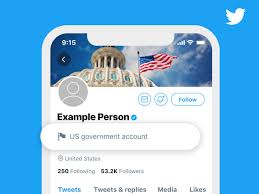Twitter has announced that it will now display new labels on the accounts of state-affiliated media entities, providing more transparency around the information shared by what are essentially Government-moderated accounts.
As explained by Twitter:
“When it comes to conversations with government and state-affiliated media accounts on Twitter, we’re helping to make the experience more transparent. We’ll now use two distinct profile labels for these types of accounts, so you can easily identify them and their Tweets.”
As you can see in the image above, those two variants are ‘Government account’ for officials who represent respective government organizations, and ‘state-affiliated media’ for media entities which are largely controlled by a government body.
So what, exactly, qualifies for each category?
- The ‘government account’ label will be added to the accounts of key government officials, including foreign ministers, institutional entities, ambassadors, official spokespeople, and key diplomatic leaders. At launch, this label will only be allocated to ‘senior officials and entities who are the official voice of the state abroad’
- The ‘state-affiliated media’ label will be attached to accounts ‘belonging to state-affiliated media entities, their editors-in-chief, and/or their senior staff’.
The state-affiliated media label will likely have the most impact. Many users would not be aware, for example, that the providers they’re getting news from are state-controlled, and therefore restricted in what they can share, and generally obligated to promote that nation’s interests in a positive light.
Having a prominent ‘state-affiliated media’ label on both their profiles and tweets could see more people think twice about sharing content from these providers – or at the least, prompt more questions over what the motivation might be behind the news content that each share.
Facebook introduced similar labels back in June, as part of its ongoing efforts to increase transparency ahead of the US Presidential Election.
Twitter also added labels for political candidates and elected officials in the US back in 2018, which it updated late last year.
Given that the majority of people now get at least some of their news coverage from social media, and state-affiliated groups now have a history of trying use social platforms to control certain narratives, the labels make a lot of sense, and should help improve digital media literacy – or again, at the least, make users question the motivations behind each post.
In addition to this, Twitter says that it will also no longer include state-affiliated media accounts or their Tweets in its recommendations, ‘including on the home timeline, notifications, and search’. Twitter says that this is part of its ongoing effort to support the free and independent press.
Twitter will begin by adding the new labels to a defined group of countries, before expanding them to a wider range of organizations and individuals in the future.
